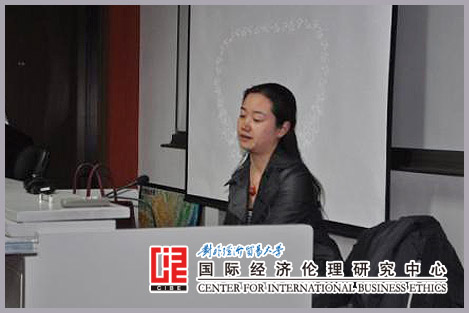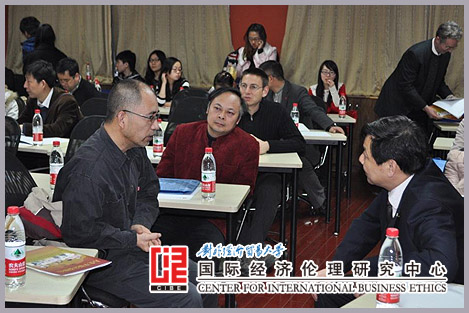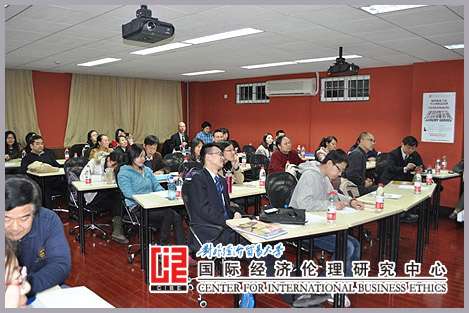At 7 o’clock, Mar. 30th, 2012, CIBE hosted a quarterly membership event. The topic w as “Today’s Luxury Consumption From an Ethical Perspective” as “Today’s Luxury Consumption From an Ethical Perspective”
Dr. Stephan Rothlin, secretary general of CIBE, encouraged guests to join the discussion on luxury consumption. He referred specifically to the enormous wealth gap, noting that an obsession of the rich with luxury articles makes those who cannot afford such goods even more resentful. Dr. Rothlin continued to encourage participants to express their opinion on the issue, leading to discussion.
Next to speak was Ms. Shangguan Ruye, the lecturer and Responsible Editor of Project Department of CCTV Multiple Channel. Ms. Shangguan introduced three topics of luxury consumption: what constitutes luxuries, the difference between luxuries and artworks, and luxury as a culture. Through the discussion, the audiences’deepened their understanding about the brands and cultural connotation of luxuries. Ms. Shangguan pointed out that for much of China’s history, luxuries were specifically enjoyed by imperial members and aristocracies. Thus many companies were unable to transform into widely popular name brands, unlike most luxury companies of the western world. She went on to describe the phenomenon of “de-massifying”, or being unable to industrialize products as easily as western brands. Although the technological bottlen eck would be solved in time, there is still little information with which to form the concept of “Chinese-style luxuries”. eck would be solved in time, there is still little information with which to form the concept of “Chinese-style luxuries”.
A discussion followed, led by the host, Prof. Liu Baocheng, Director of CIBE. Prof. Liu started with basic questions, which culminated in a spirited discourse.
Mr. Li Bochun, Master of Chinese Culture,asserted that Chinese people should control their enthusiasm whenadmiring western luxuries. The predominantperception of luxury consumers today is to possess, which has caused the current absence of universal values in China. Mr. Li prompted the audience to contemplate the difficult question, “what is happiness?”
Dr. Song Hongjun, former vice director of Anti-Money Laundering Bureau of the People’s Bank of China, addressed that the western world is now facing social crisis after experiencing the “Middle Class Trap”, which is also arising in Beijing. He made the argument that luxuries are condensed with value and the users manifest the value. He began to question why Chinese people prefer to spend billions of RMB shopping abroad, when there are  elements of luxuries inherent in the Chinese culture system. The participants reached the consensus that, currently, the taxation system of China hasn’t reached the level and extent to release luxuries consumption duty, so Chinese people shrewdly reflect their pursuit of quality on consumption of luxuries, although they lack the classification and identification of luxuries, confidence and culture deposits. elements of luxuries inherent in the Chinese culture system. The participants reached the consensus that, currently, the taxation system of China hasn’t reached the level and extent to release luxuries consumption duty, so Chinese people shrewdly reflect their pursuit of quality on consumption of luxuries, although they lack the classification and identification of luxuries, confidence and culture deposits.
Then, luxuries purchaser Ms. Wu Meng shared a group of statistics with the participants. Surveys show that men spend more on luxuries than women, mainly because men pay greater attention to the grade and status. 30% of luxuries purchased by Chinese were for gifts, and only a small proportion of the luxuries consumers wereones who really knew the connotation of the brands. The majority of the luxuries consumers are from the second tier cities of South China, such as Chengdu, Jiangsu and Zhejiang.Ms. Wu Meng argued that further leading is needed for the current consuming habit and direction of Chinese consumers.
As the discussion went on, the audiences formed discussion groups with juxtaposing views, such as the old and the young, the male and the female, and the scholars and the commoners. This discussion brought the event to a close. Many audience membersexpressed excitement for the next event.
|
